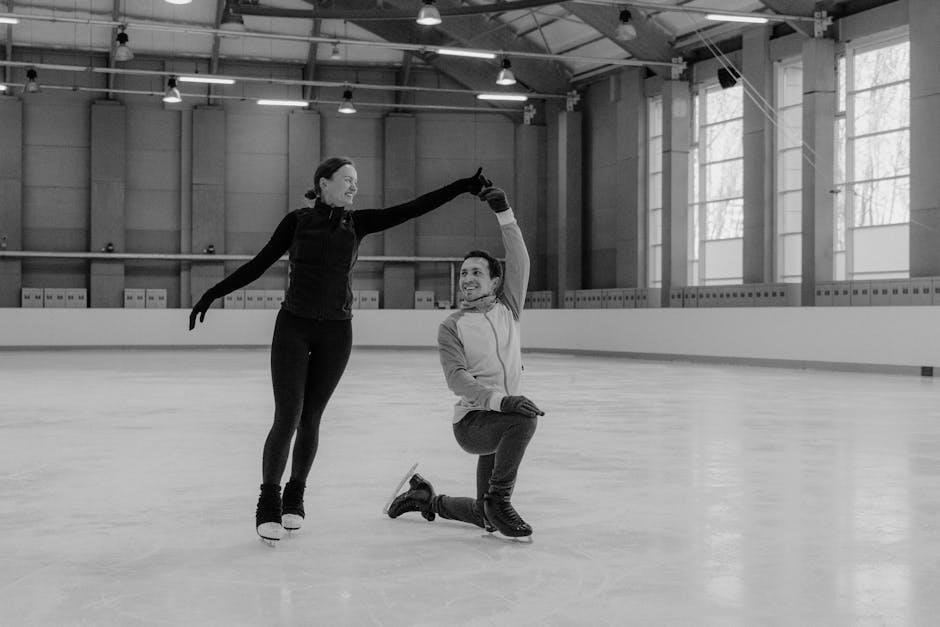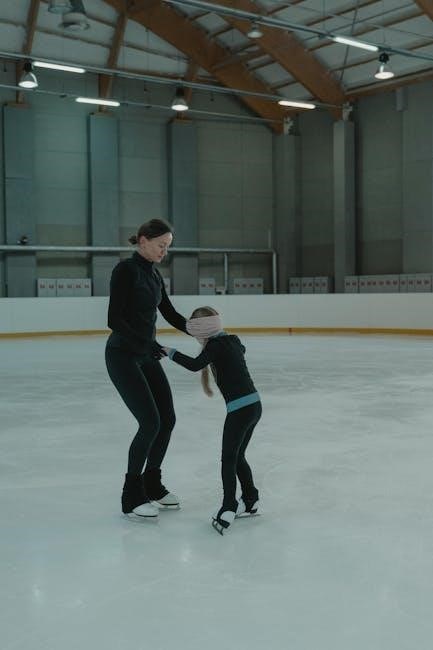Gottman exercises are evidence-based tools designed to strengthen relationships, developed by Dr. John Gottman. They offer practical techniques to enhance communication, intimacy, and conflict resolution, fostering deeper connections and more fulfilling partnerships.
1.1 What Are Gottman Exercises?
Gottman exercises are evidence-based, research-driven activities designed to improve relationship dynamics. Developed by Dr. John Gottman, these exercises focus on enhancing communication, emotional connection, and conflict resolution. They provide practical tools for couples to strengthen their bond, fostering intimacy and understanding. The exercises are grounded in decades of relationship research and are tailored to help partners build a deeper, more resilient connection. They include activities like sharing fondness, turning toward each other, and understanding love maps, all aimed at nurturing a stronger, more fulfilling partnership.
1.2 The Importance of Relationship Exercises
Relationship exercises, like those in the Gottman exercises PDF, play a vital role in fostering connection and understanding between partners. They help couples maintain emotional intimacy, navigate conflicts, and strengthen their bond. Regular practice promotes communication, empathy, and mutual support, which are essential for long-term relationship satisfaction. By addressing issues proactively, these exercises prevent misunderstandings from escalating and encourage personal and relational growth. They empower couples to build resilience, deepen their emotional intelligence, and cultivate a stronger, more fulfilling partnership over time.
1.3 Overview of the Gottman Method
The Gottman Method, developed by Dr. John Gottman, is a research-based approach to improving relationships through specific techniques and exercises. It focuses on enhancing emotional intelligence, communication, and conflict resolution skills. By fostering empathy, understanding, and connection, the method helps couples build a stronger foundation for their relationship. It emphasizes the importance of small, intentional actions to nurture love and respect, creating a framework for lasting relationship growth and satisfaction. This approach is widely recognized for its practical and effective strategies.

The Science Behind Gottman Exercises
Gottman exercises are rooted in decades of research by Dr. John Gottman, who studied thousands of couples to identify patterns predicting relationship success or failure. His empirical approach provides a foundation for effective, science-backed tools to enhance relationship health and resilience.
2.1 The Research of John Gottman
Dr. John Gottman’s groundbreaking research has revolutionized our understanding of relationships. Through decades of studying thousands of couples, he identified key predictors of relationship success and failure. His work revealed the importance of emotional intelligence, communication patterns, and conflict resolution. Gottman’s findings have shaped the development of evidence-based exercises that help couples build stronger, more resilient relationships. His research emphasizes the significance of empathy, trust, and mutual support in fostering long-term relationship satisfaction.
2.2 The Four Horsemen of the Apocalypse
The Four Horsemen of the Apocalypse, identified by Dr. John Gottman, are four destructive communication patterns that predict relationship dissolution. They include criticism, contempt, defensiveness, and stonewalling. These behaviors erode trust and intimacy, leading to emotional disconnection. Criticism attacks a partner’s character, while contempt conveys disrespect. Defensiveness prevents accountability, and stonewalling shuts down communication. Recognizing these patterns is crucial for improving relationship dynamics and fostering healthier interactions. Gottman’s research highlights the importance of addressing these behaviors to build resilient relationships.
2.3 The Concept of Emotional Intelligence in Relationships
Emotional intelligence (EQ) plays a vital role in relationships by enhancing partners’ ability to understand and manage emotions. It involves self-awareness, empathy, and effective communication. High EQ fosters deeper connections, allowing couples to navigate conflicts constructively. Dr. Gottman’s research emphasizes that emotionally intelligent partners are better at recognizing and responding to each other’s needs, creating a supportive and understanding environment. By cultivating EQ, couples can build resilience, strengthen intimacy, and maintain harmony in their relationship. This concept is central to the Gottman method, promoting healthier and more fulfilling partnerships.

Understanding the Gottman Exercises PDF
The Gottman Exercises PDF is a comprehensive guide offering practical exercises and techniques to enhance relationship dynamics. Developed by Dr. John Gottman, it provides insights for couples and therapists alike, focusing on communication, emotional understanding, and conflict resolution strategies.
3.1 What to Expect in the PDF
The Gottman Exercises PDF is a detailed resource filled with practical exercises, worksheets, and strategies to improve relationship dynamics. It includes activities designed to enhance communication, foster emotional connections, and address conflicts effectively. Readers can expect step-by-step guides, real-life examples, and evidence-based techniques to strengthen relationships. The PDF is structured to be user-friendly, offering actionable tools for couples and therapists to promote intimacy, understanding, and long-term relationship satisfaction.
3.2 How to Use the Gottman Exercises Effectively
To use the Gottman Exercises effectively, start by setting clear goals and committing to regular practice. Choose exercises that target specific areas of your relationship, such as communication or emotional intimacy. Create a comfortable environment, ensuring both partners feel safe and open. Approach each activity with patience and curiosity, focusing on growth rather than perfection. Reflect on progress and adapt exercises as needed, celebrating small victories along the way to foster a deeper connection and lasting improvements in your relationship.
3.3 The Structure of the Exercises
Gottman exercises are structured to guide couples through specific, research-based activities designed to enhance relationship skills. Each exercise typically includes clear instructions, step-by-step processes, and reflection phases. They often begin with an introduction to the concept, followed by practical tasks that encourage communication, empathy, and intimacy. Many exercises incorporate moments for discussion or journaling to deepen understanding and reinforce positive behaviors. The structured format ensures couples can follow along easily, making progress toward healthier, more fulfilling relationships with consistent practice and open-minded engagement.

Key Gottman Exercises for Couples
Gottman exercises include activities like “The Aftermath of a Fight” and “Building Love Maps,” designed to foster connection, resolve conflicts, and strengthen emotional bonds in relationships.
4.1 The Aftermath of a Fight
The “Aftermath of a Fight” exercise helps couples process conflicts constructively. It guides partners to understand each other’s perspectives, express needs, and repair emotional wounds. By fostering active listening, empathy, and mutual understanding, this exercise encourages couples to move beyond blame and defensiveness. It emphasizes rebuilding connection and finding resolution, rather than dwelling on past arguments. Regular practice of this exercise can lead to healthier conflict resolution and a stronger, more resilient relationship over time.
4.2 The Four Horsemen Exercise
The Four Horsemen Exercise, based on Dr. John Gottman’s research, helps couples identify and address destructive communication patterns—criticism, contempt, defensiveness, and stonewalling. Through guided reflection and discussion, partners learn to recognize these behaviors in their interactions and develop strategies to replace them with constructive communication. By addressing these negative patterns, couples can improve conflict resolution, strengthen their emotional connection, and create a more supportive relationship environment. This exercise is a powerful tool for fostering awareness and promoting healthier communication habits, leading to a more fulfilling partnership;
4.3 Building Love Maps
Building Love Maps is a Gottman exercise focused on deepening emotional intimacy by creating a mental map of your partner’s inner world. This involves understanding their thoughts, feelings, desires, and experiences. By regularly asking open-ended questions and actively listening, couples can stay attuned to each other’s needs. This exercise fosters a sense of connection and understanding, helping partners feel seen and valued. Regularly updating love maps ensures that the relationship remains vibrant and fulfilling, even as life circumstances change. It’s a simple yet powerful way to nurture emotional closeness and strengthen the bond between partners.
4.4 The Turning Toward Exercise
The Turning Toward Exercise helps couples reconnect by fostering emotional intimacy and understanding. It encourages partners to pause during conflicts or daily interactions and actively engage with each other. By sharing thoughts, feelings, and needs in a supportive manner, couples can strengthen their bond and reduce misunderstandings. This exercise emphasizes the importance of being present and responsive, creating a safe space for open communication. Regular practice helps build trust and deepens emotional connection, making it easier to navigate life’s challenges together.
4.5 Sharing Fondness and Admiration
Sharing Fondness and Admiration is a powerful Gottman exercise that fosters gratitude and affection in relationships. Partners take turns expressing appreciation for each other, highlighting specific qualities, actions, or memories. This practice strengthens emotional bonds by reinforcing positive feelings and countering negativity. Regularly sharing admiration helps couples stay connected, builds resilience, and cultivates a culture of appreciation. It’s a simple yet impactful way to nurture intimacy and ensure both partners feel valued and cherished in the relationship.

Real-Life Applications of Gottman Exercises
Gottman exercises offer practical tools for everyday relationship challenges, enhancing communication, emotional connection, and conflict resolution. They empower couples to build resilience and strengthen their bond through simple, consistent practices.
5.1 Improving Communication Skills
Gottman exercises focus on enhancing communication by teaching active listening, empathy, and clarity. Couples learn to express needs effectively, reducing misunderstandings and fostering a deeper understanding of each other. Practical techniques like “I” statements and emotional labeling help partners navigate conversations with care and precision. These tools encourage open dialogue, creating a safe space for vulnerability and connection. By improving communication, couples can address issues before they escalate, building a stronger, more supportive relationship. Regular practice strengthens these skills, making meaningful conversations a cornerstone of their partnership.
5.2 Strengthening Emotional Bonds
Gottman exercises help couples build emotional intimacy by fostering mutual understanding and connection. Techniques like sharing fondness, admiration, and gratitude encourage partners to appreciate each other deeply. These exercises promote emotional attunement, helping couples feel seen and valued. By regularly practicing these methods, couples can create a culture of trust, empathy, and affection. Strengthening emotional bonds leads to a more resilient and fulfilling relationship, where both partners feel secure and supported in their connection.
5.3 Conflict Resolution Strategies
Gottman exercises provide effective strategies for resolving conflicts by teaching couples to address disagreements constructively. Techniques like de-escalation, repair attempts, and understanding each other’s perspectives help couples move beyond arguments. These exercises encourage active listening, empathy, and problem-solving, fostering a culture of mutual respect; By learning to navigate conflicts in a healthy way, couples can transform disagreements into opportunities for growth and understanding, ultimately strengthening their relationship and building resilience against future challenges.

Incorporating Gottman Exercises into Daily Life
Incorporating Gottman exercises into daily life involves simple practices that enhance communication and connection, fostering meaningful change over time through consistent effort and dedication.
6.1 Creating a Routine for Relationship Growth
Creating a routine for relationship growth involves consistent practice of Gottman exercises, fostering a culture of connection and understanding. Schedule regular time for exercises, such as daily conversations or weekly reflections, to strengthen your bond. Start small with manageable activities and gradually build as comfort grows. Consistency is key to nurturing emotional intimacy and improving communication. By prioritizing these practices, you cultivate a stronger, more resilient relationship over time.
6.2 Setting Goals for Relationship Improvement
Setting clear, achievable goals is essential for fostering growth in your relationship. Identify specific areas you both want to improve, such as communication or emotional connection. Use the SMART goal framework—Specific, Measurable, Achievable, Relevant, and Time-bound—to create actionable plans. For example, aim to practice active listening daily or schedule weekly date nights. Regularly review and adjust these goals to ensure they remain meaningful and aligned with your shared vision. This process helps build accountability and keeps your relationship on a positive trajectory.
6.3 Tracking Progress Over Time
Regularly tracking progress is crucial for maintaining momentum in relationship growth. Use journals or apps to log improvements in communication, emotional connection, and conflict resolution. Schedule periodic check-ins to reflect on achievements and areas needing attention. Celebrate small victories to stay motivated and adjust strategies as needed. Consistent effort and reflection foster lasting change, ensuring both partners remain committed to nurturing their relationship over time.

The Role of Gottman Exercises in Couples Therapy
Gottman exercises play a vital role in couples therapy by providing structured, evidence-based tools to address relationship challenges. They help therapists guide couples toward healthier communication, emotional connection, and conflict resolution, fostering lasting improvement and strengthening partnerships.
7.1 How Therapists Use Gottman Exercises
Therapists use Gottman exercises to guide couples in improving communication, emotional understanding, and conflict resolution. These exercises are often tailored to address specific relationship challenges, fostering intimacy and trust. By incorporating structured activities, therapists help couples identify patterns, strengthen connection, and develop healthier interaction habits. The exercises complement other therapeutic approaches, providing actionable steps for couples to practice outside sessions, ensuring progress and lasting relationship improvement.
7.2 Case Studies of Successful Outcomes
Case studies highlight the effectiveness of Gottman exercises in transforming relationships. Couples who struggled with communication and conflict reported improved connection after using tools like “Aftermath of a Fight.” One couple enhanced their emotional intimacy through “Building Love Maps,” while another resolved recurring arguments with “The Four Horsemen Exercise.” Therapists often share these success stories to illustrate how consistent practice leads to lasting positive changes, helping couples build stronger, more resilient relationships over time.
7.3 When to Seek Professional Help
Couples should seek professional help when conflicts persist, communication breaks down, or emotional disconnection deepens. A therapist trained in Gottman methods can guide you through exercises like “Aftermath of a Fight” or “Turning Toward” to address specific issues. If you struggle to apply the exercises independently or face unresolved relationship challenges, professional support can provide tailored strategies and help you navigate complex emotions. Seeking help early can prevent further deterioration and foster a more compassionate, understanding partnership.

Benefits of Gottman Exercises
Gottman exercises foster stronger relationships by improving communication, conflict resolution, and emotional intimacy. They empower couples to build trust, understanding, and lasting, fulfilling connections, enhancing overall relationship satisfaction.
8.1 Enhanced Relationship Satisfaction
Gottman exercises significantly contribute to enhanced relationship satisfaction by fostering deeper emotional connections and improving communication. Couples learn to navigate conflicts effectively, leading to increased trust and intimacy. These exercises encourage mutual understanding, appreciation, and respect, creating a stronger bond between partners. By addressing core issues and promoting positive interactions, Gottman exercises help couples build a more fulfilling and satisfying relationship, leading to long-term happiness and resilience in the face of challenges.
8.2 Improved Conflict Resolution Skills
Gottman exercises are renowned for enhancing conflict resolution skills, helping couples navigate disagreements constructively. By teaching active listening, de-escalation techniques, and empathy, these exercises reduce arguments and foster understanding. Couples learn to approach conflicts as opportunities for growth rather than division. The emphasis on compromise and mutual respect leads to more effective problem-solving, strengthening the relationship and reducing the likelihood of unresolved issues. Over time, partners develop the tools to resolve conflicts in a healthy, productive manner.
8.3 Increased Emotional Intimacy
Gottman exercises foster increased emotional intimacy by encouraging open communication and vulnerability. Activities like sharing fondness, admiration, and gratitude help partners reconnect on a deeper level. By focusing on understanding each other’s needs and desires, couples build trust and emotional closeness. These exercises create a safe space for vulnerability, allowing partners to feel seen and valued. Over time, this strengthens the emotional bond, leading to a more fulfilling and intimate relationship.
8.4 Building a Supportive Partnership
Gottman exercises emphasize the importance of fostering a supportive partnership by encouraging mutual understanding and teamwork. By practicing active listening and empathy, couples learn to prioritize each other’s needs. Exercises like “Turning Toward” and “Building Love Maps” help partners become better allies, creating a foundation of trust and reliability. This collaborative approach strengthens the bond, allowing couples to navigate life’s challenges together with confidence and unity. Over time, this leads to a more resilient and harmonious relationship.

Common Challenges with Gottman Exercises
Common challenges include resistance to change, difficulty managing emotional triggers, and maintaining consistent practice. These obstacles can hinder progress but are surmountable with commitment and patience.
9.1 Overcoming Resistance to Change
Overcoming resistance to change in relationships requires both partners to commit to growth. Open communication about fears and expectations can alleviate hesitations. Setting realistic goals and celebrating small progress helps build momentum. Encouraging active participation and mutual support fosters a sense of teamwork. Acknowledging the discomfort of change while emphasizing its benefits can motivate couples to persist. Patience and understanding are key, as resistance often stems from fear or unfamiliarity. With consistent effort, couples can navigate this challenge and embrace new patterns of interaction.
9.2 Managing Emotional Triggers
Managing emotional triggers involves identifying and understanding personal patterns that lead to reactivity. Couples can learn to recognize the signs of emotional escalation and implement strategies like pausing the conversation to calm down. Practicing self-regulation techniques, such as deep breathing or mindfulness, can help individuals respond thoughtfully rather than react impulsively. Gottman exercises encourage partners to communicate openly about their triggers and work together to create a safe, non-judgmental space for dialogue. This fosters empathy and reduces the likelihood of conflicts spiraling out of control.
9.3 Maintaining Consistency in Practice
Maintaining consistency in practicing Gottman exercises is crucial for relationship growth. Couples should set realistic goals and establish a regular routine, even if it’s just a few minutes daily. Incorporating exercises into daily life, such as during meals or before bed, helps create lasting habits. Tracking progress and celebrating small victories can motivate continued effort. Consistency reinforces new patterns of communication and emotional connection, leading to stronger, more resilient relationships over time.
Gottman exercises offer a powerful path to fostering meaningful connections and transforming relationships. By dedicating time and effort, couples can cultivate lasting change and deeper intimacy together.
10.1 Summary of Key Takeaways
Gottman exercises provide evidence-based strategies to enhance relationships by improving communication, conflict resolution, and emotional bonds. Techniques like “Building Love Maps” and “Turning Toward Instead of Away” foster deeper connections. By focusing on mutual understanding and empathy, these exercises help couples navigate challenges effectively. Regular practice strengthens intimacy and resilience, offering a lasting impact on relationship satisfaction. Whether used independently or with therapy, Gottman exercises empower couples to build a stronger, more fulfilling partnership over time.
10.2 Encouragement to Start the Journey
Embracing Gottman exercises is a powerful step toward nurturing a healthier, more meaningful relationship. These tools are designed to be accessible and impactful, offering a clear path to connection and growth. By committing to these practices, you and your partner can cultivate deeper understanding, empathy, and intimacy. Remember, relationships evolve with effort and dedication. Starting this journey, even with small steps, can lead to profound positive changes over time. Take the first step today and invest in a brighter, more loving future together.
10.3 Final Thoughts on Relationship Growth
Relationship growth is a journey that requires effort, time, and mutual commitment. Gottman exercises offer a proven foundation for fostering connection, understanding, and resilience. By consistently applying these tools, couples can build stronger bonds, navigate challenges with empathy, and create a lasting, meaningful partnership. Remember, growth is not a destination but a continuous process. With patience and dedication, relationships can flourish, leading to a deeper sense of intimacy, trust, and shared joy. Embrace the process and celebrate the small victories along the way.

Additional Resources
Find the Gottman exercises PDF online, explore books by John Gottman, and enroll in online courses or workshops to enhance your relationship skills and knowledge.
11.1 Where to Find Gottman Exercises PDF
The Gottman exercises PDF can be found on the official Gottman Institute website, as well as through authorized retailers like Amazon or Google Books. Additionally, some relationship therapists and coaches offer downloadable versions as part of their resources. Ensure you access the PDF from reputable sources to maintain quality and authenticity. Searching with terms like “Gottman exercises PDF download” may also yield results, but verify the source for accuracy. Joining online relationship communities or forums can provide links to trusted downloads.
11.2 Recommended Books by John Gottman
John Gottman’s books are indispensable for relationship growth. The Seven Principles for Making Marriage Work offers practical insights into building lasting relationships. The Relationship Cure focuses on enhancing emotional connections, while Hold Me Tight (co-authored with Sue Johnson) explores attachment theory in relationships. These books complement the Gottman exercises PDF by providing deeper understanding and actionable strategies. They are available on platforms like Amazon, Barnes & Noble, and the Gottman Institute’s official website, offering invaluable tools for couples and individuals seeking to strengthen their relationships.
11.3 Online Courses and Workshops
Online courses and workshops based on Gottman exercises offer structured learning experiences. Platforms like the Gottman Institute’s website, Coursera, and Udemy provide courses with video lessons, interactive exercises, and expert guidance. These resources help couples and individuals apply Gottman principles effectively. Workshops often include live sessions with certified therapists, offering personalized insights. These programs are ideal for those seeking flexible, in-depth learning to enhance relationship skills and emotional intelligence. They complement the Gottman exercises PDF by providing practical, guided experiences for lasting relationship growth.



